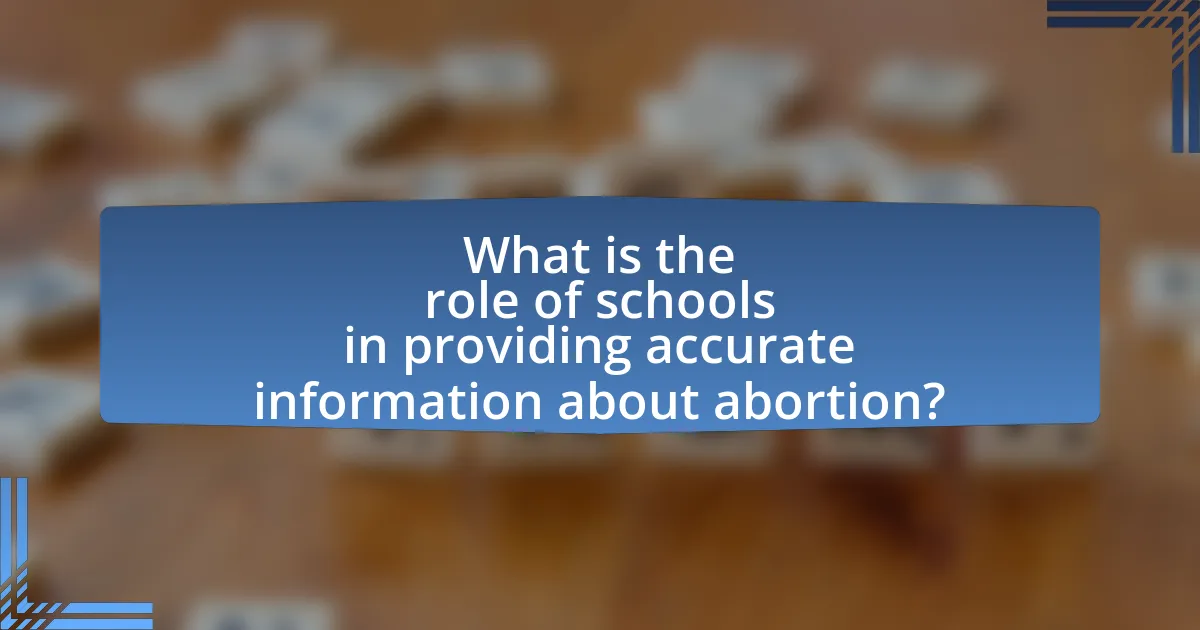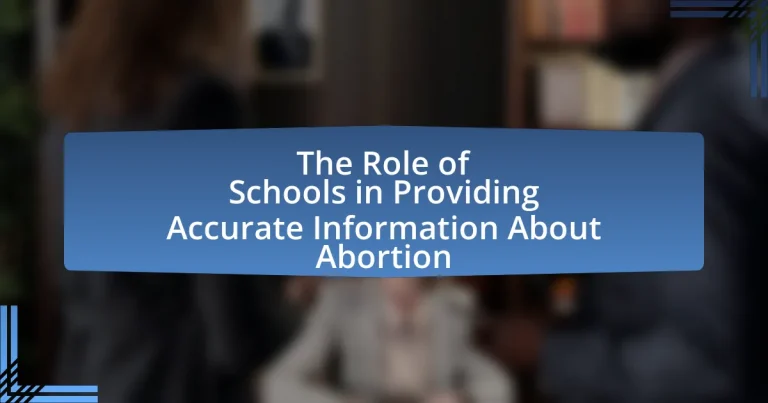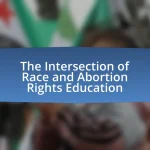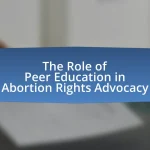The article examines the critical role of schools in providing accurate information about abortion through comprehensive sexual education. It highlights the importance of equipping students with factual knowledge regarding reproductive health, which can lead to informed decision-making and reduced stigma surrounding abortion. The article discusses the consequences of misinformation, current educational practices, and the challenges schools face in delivering accurate information. Additionally, it outlines best practices for teaching about abortion, the significance of teacher training, and the impact of societal attitudes and legal restrictions on abortion education in schools. Overall, the article emphasizes that accurate abortion education is essential for fostering informed choices and improving student well-being.

What is the role of schools in providing accurate information about abortion?
Schools play a crucial role in providing accurate information about abortion by integrating comprehensive sexual education into their curricula. This education equips students with factual knowledge about reproductive health, including the medical, legal, and ethical aspects of abortion. Research indicates that comprehensive sexual education can lead to informed decision-making among adolescents, reducing misinformation and stigma surrounding abortion. For instance, studies show that states with comprehensive sex education programs have lower rates of unintended pregnancies and abortions among teenagers, highlighting the effectiveness of accurate information dissemination in schools.
Why is accurate information about abortion important in schools?
Accurate information about abortion is important in schools because it equips students with the knowledge necessary to make informed decisions regarding their reproductive health. Comprehensive education on abortion helps dispel myths and misconceptions, which can lead to stigma and misinformation. Research indicates that when students receive factual information about reproductive health, including abortion, they are more likely to engage in responsible decision-making and seek appropriate healthcare services. For instance, a study published in the Journal of Adolescent Health found that comprehensive sex education, which includes information about abortion, is associated with lower rates of unintended pregnancies among adolescents. Thus, providing accurate information in schools is essential for fostering informed, healthy choices among students.
What are the potential consequences of misinformation about abortion?
Misinformation about abortion can lead to significant public health consequences, including increased stigma, reduced access to safe abortion services, and negative mental health outcomes for individuals seeking care. For instance, studies have shown that misinformation can perpetuate myths about the safety and legality of abortion, which may deter individuals from seeking necessary medical assistance. According to a 2020 report by the Guttmacher Institute, misinformation contributes to a lack of understanding regarding reproductive rights, resulting in barriers to accessing safe and legal abortion services. Furthermore, individuals exposed to false information may experience heightened anxiety and distress, as evidenced by research published in the Journal of Health Communication, which indicates that misinformation can exacerbate feelings of shame and isolation among those considering abortion.
How does accurate information impact students’ understanding of reproductive health?
Accurate information significantly enhances students’ understanding of reproductive health by providing them with essential knowledge about their bodies, sexual health, and the implications of reproductive choices. Research indicates that comprehensive sexual education, which includes accurate information about reproductive health, leads to improved decision-making among adolescents, reducing rates of unintended pregnancies and sexually transmitted infections. For instance, a study published in the Journal of Adolescent Health found that students who received comprehensive sexual education were 50% less likely to experience an unintended pregnancy compared to those who did not receive such education. This demonstrates that accurate information equips students with the necessary tools to make informed choices regarding their reproductive health.
What are the current practices in schools regarding abortion education?
Current practices in schools regarding abortion education vary significantly across regions and educational systems. Many schools incorporate reproductive health education into their curricula, which may include discussions about abortion, often framed within broader topics of sexual health and rights. For instance, comprehensive sex education programs in states like California and New York include information about abortion as a legal option, emphasizing informed decision-making and access to healthcare services. Conversely, some states have restrictive policies that limit or entirely exclude abortion education from school curricula, reflecting local cultural and political attitudes. Research indicates that students who receive comprehensive sexual education, including information about abortion, are better equipped to make informed choices regarding their reproductive health.
How do different educational systems approach abortion information?
Different educational systems approach abortion information through varying curricula and policies that reflect cultural, legal, and political contexts. In countries like the Netherlands, comprehensive sex education includes detailed discussions on abortion, emphasizing informed decision-making and access to healthcare services. Conversely, in the United States, the approach varies significantly by state; some states mandate abstinence-only education, which often omits abortion information, while others provide comprehensive sex education that includes discussions on abortion as a healthcare option. Research indicates that comprehensive education leads to better understanding and lower rates of unintended pregnancies, highlighting the importance of accurate information in educational settings.
What resources are available for schools to provide accurate abortion information?
Schools can access various resources to provide accurate abortion information, including educational websites, health organizations, and curriculum materials. For instance, the Guttmacher Institute offers research and data on reproductive health, while Planned Parenthood provides comprehensive educational resources tailored for schools. Additionally, the Centers for Disease Control and Prevention (CDC) offers guidelines and statistics on reproductive health that can be utilized in educational settings. These resources ensure that schools can deliver fact-based, up-to-date information regarding abortion, helping to foster informed discussions among students.
What challenges do schools face in providing accurate information about abortion?
Schools face significant challenges in providing accurate information about abortion due to political, cultural, and educational constraints. Political pressures often lead to restrictive policies that limit comprehensive sex education, resulting in incomplete or biased information being presented to students. Cultural stigma surrounding abortion can create an environment where open discussion is discouraged, further complicating educators’ ability to convey factual information. Additionally, a lack of training for teachers on reproductive health topics can hinder their capacity to provide accurate and up-to-date information. According to a 2020 report by the Guttmacher Institute, only 24 states require sex education to be medically accurate, highlighting the systemic issues that schools encounter in this area.
How do societal attitudes towards abortion influence school policies?
Societal attitudes towards abortion significantly influence school policies by shaping the curriculum and the availability of resources related to sexual health education. When communities hold conservative views on abortion, schools may adopt policies that limit discussions on the topic, focusing instead on abstinence-only education. Conversely, in more liberal areas, schools are likely to implement comprehensive sexual education that includes information about abortion, reproductive rights, and access to healthcare services. Research indicates that states with supportive attitudes towards reproductive rights tend to have more inclusive educational policies, as seen in the Guttmacher Institute’s findings, which show a correlation between state-level abortion laws and the content of sexual education programs.
What legal restrictions affect abortion education in schools?
Legal restrictions affecting abortion education in schools vary by state and often include laws that limit the teaching of abortion as a medical procedure, mandate parental consent for minors, and require abstinence-only education. For example, some states have enacted laws that prohibit educators from discussing abortion in a positive light or require that any mention of abortion be accompanied by information on alternatives, such as adoption. Additionally, parental consent laws can restrict access to information for students under 18, impacting their ability to receive comprehensive education on reproductive health. These restrictions are often justified by lawmakers citing moral or ethical concerns, which can lead to significant disparities in the quality and availability of abortion education across different regions.
How can schools improve their approach to abortion education?
Schools can improve their approach to abortion education by implementing comprehensive, evidence-based curricula that include accurate information about reproductive health, legal rights, and available resources. Research indicates that comprehensive sex education, which includes discussions about abortion, leads to better understanding and decision-making among students. For instance, a study published in the Journal of Adolescent Health found that students who received comprehensive sex education were more likely to understand the implications of abortion and access appropriate healthcare services. Additionally, training educators to facilitate open discussions and address misconceptions can foster a supportive environment for students to learn about abortion in a factual and non-judgmental manner.
What best practices can schools adopt for teaching about abortion?
Schools can adopt a comprehensive, evidence-based curriculum that includes factual information about abortion, reproductive health, and the legal context surrounding the issue. This approach ensures that students receive accurate and unbiased information, which is crucial for informed decision-making. Research indicates that comprehensive sex education, which includes discussions about abortion, leads to better understanding and reduced stigma among students (Advocates for Youth, 2020). Additionally, schools should create a safe and respectful environment for discussions, allowing students to express their views and ask questions without fear of judgment. This practice fosters critical thinking and encourages open dialogue, which is essential for understanding complex topics like abortion.
How can schools engage parents and communities in abortion education efforts?
Schools can engage parents and communities in abortion education efforts by organizing informational workshops and forums that facilitate open discussions about reproductive health. These events can include expert speakers, such as healthcare professionals and educators, who provide accurate information and answer questions, thereby fostering a supportive environment for dialogue. Research indicates that community involvement in educational initiatives enhances understanding and reduces stigma surrounding sensitive topics like abortion. For instance, a study published in the Journal of Adolescent Health found that comprehensive sexual education programs that involve parents lead to better outcomes in student knowledge and attitudes. By actively involving parents and community members, schools can create a collaborative approach to education that promotes informed decision-making and awareness.
What role do teachers play in delivering accurate information about abortion?
Teachers play a crucial role in delivering accurate information about abortion by providing students with evidence-based knowledge and fostering critical thinking. They are responsible for creating a safe environment where students can discuss sensitive topics, including reproductive health, and can access reliable resources. Research indicates that comprehensive sex education, which includes information about abortion, leads to better understanding and informed decision-making among adolescents. For instance, a study published in the Journal of Adolescent Health found that students who received comprehensive sex education were more likely to have accurate knowledge about reproductive health issues, including abortion, compared to those who did not. Thus, teachers are essential in shaping students’ understanding and attitudes towards abortion through accurate information and supportive dialogue.
What training do teachers need to effectively educate students about abortion?
Teachers need comprehensive training that includes understanding reproductive health, legal aspects of abortion, and effective communication strategies to educate students about abortion. This training should cover the biological, ethical, and social dimensions of abortion, ensuring that educators can present factual information and facilitate open discussions. Research indicates that educators who receive specialized training are more confident in addressing sensitive topics, leading to improved student understanding and engagement. For instance, a study published in the Journal of School Health highlights that teachers trained in comprehensive sexual education are better equipped to discuss abortion and related issues, resulting in more informed students.
How can teachers address sensitive topics related to abortion in the classroom?
Teachers can address sensitive topics related to abortion in the classroom by creating a safe and respectful environment for discussion. Establishing ground rules for respectful dialogue encourages students to express their views while considering differing perspectives. Incorporating evidence-based information, such as statistics from reputable sources like the Guttmacher Institute, which reports that nearly one in four women in the U.S. will have an abortion by age 45, helps ground discussions in factual context. Additionally, providing resources for students to explore the topic further, such as access to health education materials and local support services, empowers them to understand the complexities surrounding abortion. Engaging students in critical thinking exercises, such as debates or reflective writing, can also facilitate deeper understanding and respect for diverse opinions.
What are the implications of providing accurate abortion information in schools?
Providing accurate abortion information in schools leads to informed decision-making among students regarding reproductive health. When schools present factual, unbiased information about abortion, they empower students to understand their options, reducing misinformation and stigma associated with the topic. Research indicates that comprehensive sexual education, which includes accurate abortion information, correlates with lower rates of unintended pregnancies and sexually transmitted infections among adolescents. For instance, a study published in the Journal of Adolescent Health found that students who received comprehensive sexual education were more likely to use contraception effectively. Thus, accurate abortion information in schools not only enhances knowledge but also contributes to better health outcomes for students.
How does accurate abortion education contribute to overall student well-being?
Accurate abortion education significantly contributes to overall student well-being by equipping students with essential knowledge to make informed decisions regarding their reproductive health. This education reduces stigma and misinformation surrounding abortion, fostering a supportive environment where students feel empowered to seek help and resources. Research indicates that comprehensive sexual education, which includes accurate information about abortion, leads to lower rates of unintended pregnancies and sexually transmitted infections among adolescents, thereby enhancing their physical and mental health outcomes. Furthermore, students who receive accurate abortion education report higher levels of confidence in discussing reproductive health issues, which is crucial for their emotional well-being and personal development.
What impact does accurate information have on students’ decision-making regarding reproductive health?
Accurate information significantly enhances students’ decision-making regarding reproductive health by equipping them with the knowledge necessary to make informed choices. When students receive comprehensive and factual education about reproductive health, they are more likely to understand the implications of their decisions, leading to healthier outcomes. Research indicates that students who are well-informed about reproductive health options, including contraception and abortion, demonstrate lower rates of unintended pregnancies and sexually transmitted infections. For instance, a study published in the Journal of Adolescent Health found that comprehensive sex education correlates with increased use of contraceptives among adolescents, thereby reducing risky behaviors. This evidence underscores the critical role that accurate information plays in shaping responsible decision-making in reproductive health among students.
What practical steps can schools take to enhance abortion education?
Schools can enhance abortion education by integrating comprehensive sexual health curricula that include accurate information about abortion. This can be achieved by collaborating with healthcare professionals to develop age-appropriate materials that address the medical, legal, and emotional aspects of abortion. Research indicates that comprehensive sexual education leads to better understanding and reduced stigma surrounding reproductive health issues. For instance, a study published in the Journal of Adolescent Health found that students exposed to comprehensive sexual education were more likely to have accurate knowledge about contraception and abortion options. Additionally, schools can host workshops and discussions led by trained facilitators to create a safe space for students to ask questions and express their concerns. By implementing these strategies, schools can provide students with the knowledge they need to make informed decisions regarding their reproductive health.


